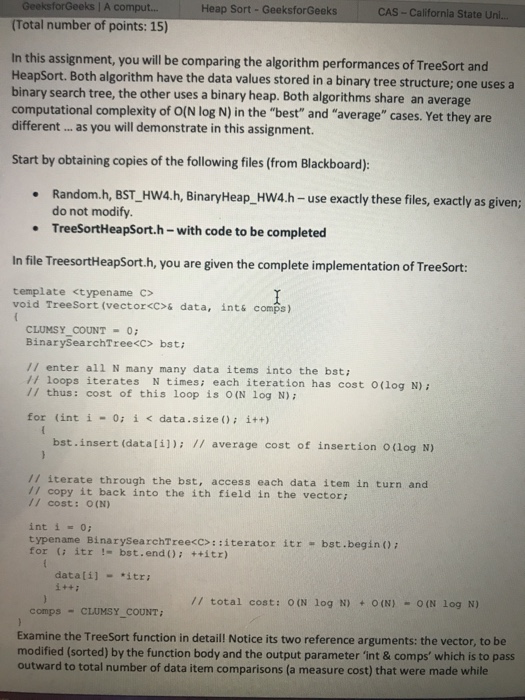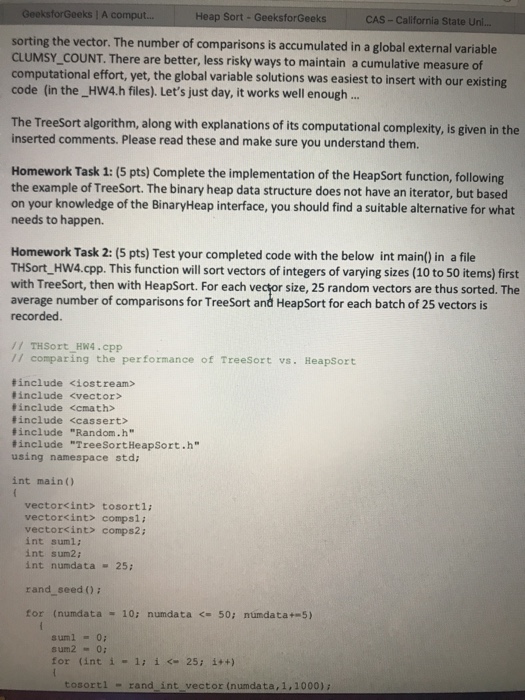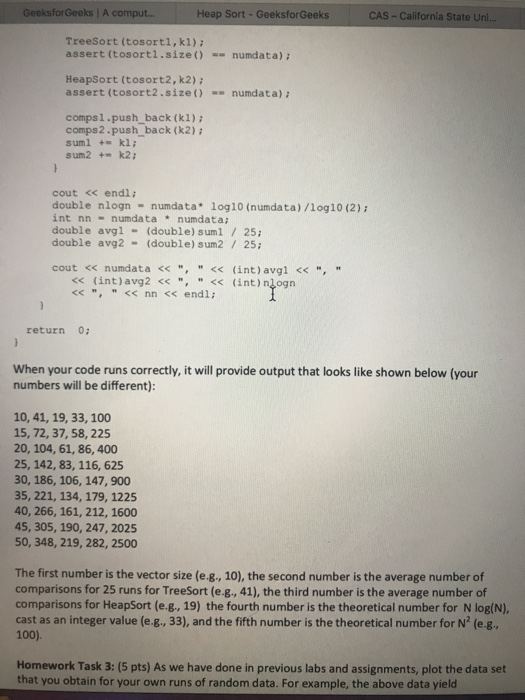Question
Homework Task 1: (5 pts) Complete the implementation of the HeapSort function, following the example of TreeSort. The binary heap data structure does not have
Homework Task 1: (5 pts) Complete the implementation of the HeapSort function, following the example of TreeSort. The binary heap data structure does not have an iterator, but based on your knowledge of the BinaryHeap interface, you should find a suitable alternative for what needs to happen.
#ifndef RANDOM_H_
#define RANDOM_H_
#include
#include
#include
#include
#include
using namespace std;
template
void rand_permute(Cont&);
void rand_seed()
{
int seed = static_cast(time(0));
srand(seed);
}
int rand_int(int a, int b)
{
return a + rand() % (b - a + 1);
}
vector rand_int_vector(int k, int a, int b)
{
set set_of_k;
vector rvec;
while (set_of_k.size()
{
int rv = rand_int(a,b);
set_of_k.insert(rv);
}
// will produce vector without duplicate values;
set::iterator itr = set_of_k.begin();
for (; itr != set_of_k.end(); ++itr)
rvec.push_back(*itr);
rand_permute(rvec);
return rvec;
}
template
void rand_permute(Cont& vals)
{
for (int i = 1; i
{
int r1 = rand_int(0,vals.size()-1);
int r2 = rand_int(0,vals.size()-1);
typename Cont::iterator itr1 = vals.begin();
typename Cont::iterator itr2 = vals.begin();
for (int i = 1; i
for (int i = 2; i
std::swap(*itr1,*itr2);
}
return;
}
#endif
----------------------------------------------------
#include
#include
#include
#include
#include "Random.h"
#include "TreeSortHeapSort.h"
using namespace std;
int main()
{
vector tosort1;
vector comps1;
vector comps2;
int sum1;
int sum2;
int numdata = 25;
rand_seed();
for (numdata = 10; numdata
{ sum1 = 0;
sum2 = 0;
for (int i = 1; i
{ tosort1 = rand_int_vector(numdata,1,1000);
vector tosort2(tosort1);
int k1,k2;
TreeSort(tosort1,k1);
assert(tosort1.size() == numdata);
HeapSort(tosort2,k2);
assert(tosort2.size() == numdata);
comps1.push_back(k1);
comps2.push_back(k2);
sum1 += k1;
sum2 += k2;
cout
double nlogn = numdata* log10(numdata)/log10(2); int nn = numdata * numdata;
double avg1 = (double)sum1 / 25;
double avg2 = (double)sum2 / 25;
cout
}
}
return 0;
}
-------------------------------------
#ifndef TSORTHSORT_H_
#define TSORTHSORT_H_
#include
#include
#include "BST_HW4.h"
#include "BinaryHeap_HW4.h"
using namespace std;
extern int CLUMSY_COUNT;
template
void TreeSort(vector& data, int& comps)
{
CLUMSY_COUNT = 0;
BinarySearchTree bst;
for (int i = 0; i
{
bst.insert(data[i]);
}
int i = 0;
typename BinarySearchTree::iterator itr = bst.begin();
for (; itr != bst.end(); ++itr)
{
data[i] = *itr;
i++;
}
comps = CLUMSY_COUNT;
}
template
void HeapSort(vector&data, int& comps)
{
CLUMSY_COUNT = 0;
// HW4: fill in to implement HeapSort;
comps = CLUMSY_COUNT;
}
#endif
--------------------------------------------------------------
#ifndef BINARYHEAP_H_
#define BINARYHEAP_H_
#include
#include "Vector.h"
using namespace std;
extern int CLUMSY_COUNT;
template
class BinaryHeap
{
public:
BinaryHeap()
: heap(100), currentSize(0)
{}
BinaryHeap(int capacity)
: heap(capacity), currentSize(0)
{}
BinaryHeap(const Vector&);
bool isEmpty() const
{
return currentSize == 0;
}
int size() const
{
return currentSize;
}
const C & findMin() const
{
return heap[1];
}
void insert(const C &);
void insert(C &&);
void deleteMin();
void deleteMin(C &);
void makeEmpty()
{
while (!heap.isEmpty())
heap.pop_back();
currentSize = 0;
}
void printHeap() const
{
printHeap(1,0);
}
private:
int currentSize;
Vector heap;
void buildHeap()
{
for (int i = currentSize/2; i > 0; i--)
percolateDown(i);
}
void percolateDown(int);
void printHeap(int,int) const;
};
template
BinaryHeap::BinaryHeap(const Vector& items)
: heap(items.size() + 10), currentSize(items.size())
{
for (int i = 0; i
heap[i + 1] = items[i];
buildHeap();
}
template
void BinaryHeap::insert(const C& x)
{
if (currentSize == heap.size()-1)
heap.resize(heap.size()*2);
int hole = ++currentSize;
C copy = x;
heap[0] = std::move(copy);
for (; x
{
CLUMSY_COUNT++;
heap[hole] = std::move(heap[hole/2]);
}
heap[hole] = std::move(heap[0]);
}
template
void BinaryHeap::insert(C&& x)
{
if (currentSize == heap.size()-1)
heap.resize(heap.size()*2);
int hole = ++currentSize;
C copy = x;
heap[0] = std::move(copy);
for (; x
heap[hole] = std::move(heap[hole/2]);
heap[hole] = std::move(heap[0]);
}
template
void BinaryHeap::deleteMin()
{
assert(!isEmpty());
heap[1] = std::move(heap[currentSize--]);
percolateDown(1);
}
template
void BinaryHeap::deleteMin(C & minItem)
{
assert(!isEmpty());
minItem = std::move(heap[1]);
heap[1] = std::move(heap[currentSize--]);
percolateDown(1);
}
template
void BinaryHeap::percolateDown(int hole)
{
int child;
C tmp = std::move(heap[hole]);
for (; hole * 2
{
CLUMSY_COUNT++;
child = hole * 2;
if (child != currentSize && heap[child + 1]
child++;
if (heap[child]
heap[hole] = std::move(heap[child]);
else
break;
}
heap[hole] = std::move(tmp);
}
template
void BinaryHeap::printHeap(int index, int offset) const
{
if (index > currentSize)
return;
for (int i = 1; i
cout
cout
printHeap(2*index, offset + 1);
printHeap(2*index+1, offset + 1);
return;
}
#endif
-----------------------------------------------------------------------------------------------------------
#ifndef BINARY_SEARCH_TREE_H
#define BINARY_SEARCH_TREE_H
//#include "dsexceptions.h"
#include
#include
#include
#include
using namespace std;
int CLUMSY_COUNT = 0;
template
class BinarySearchTree
{
private:
struct BinaryNode
{
C element;
BinaryNode *left;
BinaryNode *right;
BinaryNode *parent;
BinaryNode(const C & elem, BinaryNode *lt,
BinaryNode *rt,
BinaryNode *par)
: element(elem), left(lt), right(rt), parent(par)
{}
};
public:
//struct BinaryNode;
class iterator
{public:
iterator() : current{nullptr}
{}
iterator(BinaryNode * t) : current(t)
{}
C & operator *() const
{
return current->element;
}
bool operator ==(iterator other) const
{
return current == other.current;
}
bool operator != (iterator other) const
{
return current != other.current;
}
iterator & operator ++()
{
if (is_root(current))
current = leftmost(current->right);
else if (is_left_child(current))
{
if (current->left == nullptr && current->right
== nullptr)
{
current = current->parent;
CLUMSY_COUNT++;
}
else if (current->right != nullptr)
current = leftmost(current->right);
else
{
//; // should not happen
current = current->parent; // NEW!!
CLUMSY_COUNT++;
}
}
else if (is_right_child(current))
{
if (current->right != nullptr)
current = leftmost(current->right);else
current = follow_parent_until_leftchild(current);
}
return *this;
}
iterator & operator++(int)
{
iterator old(*this);
++(*this);
return old;
}
protected:
BinaryNode * current;
/*
bool is_right_child(BinaryNode * t)
{
return (t != nullptr && t->parent == nullptr);
}
*/
bool is_root(BinaryNode *t)
{
return (t != nullptr && t->parent == nullptr);
}
bool is_left_child(BinaryNode *t)
{
assert(t != nullptr);
if (t->parent != nullptr && t->parent->left == t)
return true;
else
return false;
}
bool is_right_child(BinaryNode *t)
{
assert(t != nullptr);
if (t->parent != nullptr && t->parent->right ==
t)
return true;
else
return false;
}
BinaryNode * leftmost(BinaryNode *t)
{
if (t == nullptr)
return nullptr;
CLUMSY_COUNT++;
if (t->left == nullptr)
return t;
return leftmost(t->left);
}
BinaryNode * follow_parent_until_leftchild(BinaryNode *t)
{
if (is_root(t))
return nullptr;
CLUMSY_COUNT++;
if (is_left_child(t))
return t->parent;
return follow_parent_until_leftchild(t->parent);
}
friend class BinarySearchTree;
};
public:
BinarySearchTree( ) : root{ nullptr }
{
}
BinarySearchTree( const BinarySearchTree & rhs ) : root{ nullptr }
{
root = clone( rhs.root);
}
BinarySearchTree( BinarySearchTree && rhs ) : root{ rhs.root }
{
rhs.root = nullptr;
}
~BinarySearchTree( )
{
makeEmpty( );
}
BinarySearchTree & operator=( const BinarySearchTree & rhs )
{
BinarySearchTree copy = rhs;
std::swap( *this, copy );
return *this;
}
BinarySearchTree & operator=( BinarySearchTree && rhs )
{
std::swap( root, rhs.root );
return *this;
}
const C & findMin( ) const
{
assert(!isEmpty());
return findMin( root )->element;
}
const C & findMax( ) const
{
assert(!isEmpty());
return findMax( root )->element;
}
bool contains( const C & x ) const
{
return contains( x, root );
}
bool isEmpty( ) const
{
return root == nullptr;
}
void printTree( ostream & out = cout ) const
{
if( isEmpty( ) )
out
else
printTree( root, out );
}
void printInternal()
{
printInternal(root,0);
}
void makeEmpty( )
{
makeEmpty( root );
}
iterator insert( const C & x )
{
return insert( x, root, root);
}
iterator insert( C && x )
{
return insert( std::move( x ), root, root);
}
void remove( const C & x )
{
remove( x, root );
}
iterator begin() const
{
BinaryNode *t = root;
while (t->left != nullptr)
t = t->left;
iterator beg(t);
return beg;
}
iterator end() const
{
iterator theend(nullptr);
return theend;
}
int size() const
{
if (root == nullptr)
return 0;
return 1 + size(root->left) + size(root->right);
}
private:
BinaryNode *root;
iterator insert( const C & x, BinaryNode * & t,
BinaryNode * & par )
{
if( t == nullptr )
{
t = new BinaryNode{ x, nullptr, nullptr, par };
return iterator(t);
}
else if( x element )
{
CLUMSY_COUNT++;
return insert( x, t->left, t );
}
else if( t->element
{
CLUMSY_COUNT++;
return insert( x, t->right, t );
}
else
return iterator(t); // Duplicate; do nothing
}
iterator insert( C && x, BinaryNode * & t, BinaryNode *
& par )
{
if( t == nullptr )
{
t = new BinaryNode{ std::move( x ), nullptr,
nullptr, par };
return iterator(t);
}
else if( x element )
return insert( std::move( x ), t->left, t );
else if( t->element
return insert( std::move( x ), t->right, t );
else
return iterator(t); // Duplicate; do nothing
}
void remove( const C & x, BinaryNode * & t )
{
if( t == nullptr )
return;
// Item not found; do nothing
if( x element )
remove( x, t->left );
else if( t->element
remove( x, t->right );
else if( t->left != nullptr && t->right !=
nullptr ) // Two children
{
t->element = findMin( t->right )->element;
remove( t->element, t->right );
}
else{
BinaryNode *oldNode = t;
if (t->left != nullptr)
{
t->left->parent = t->parent;
t = t->left;
}
else
{
if (t->right != 0)
t->right->parent = t->parent;
t = t->right;
}
delete oldNode;
}
}
BinaryNode * findMin( BinaryNode *t ) const
{
if( t == nullptr )
return nullptr;
if( t->left == nullptr )
return t;
return findMin( t->left );
}
BinaryNode * findMax( BinaryNode *t ) const
{
if( t != nullptr )
while( t->right != nullptr )
t = t->right;
return t;
}
bool contains( const C & x, BinaryNode *t ) const
{
if( t == nullptr )
return false;
else if( x element )
return contains( x, t->left );
else if( t->element
return contains( x, t->right );
else
return true;
// Match
}
void makeEmpty( BinaryNode * & t )
{
if( t != nullptr )
{
makeEmpty( t->left );
makeEmpty( t->right );
delete t;
}
t = nullptr;
}
void printTree( BinaryNode *t, ostream & out )
const
{
if( t != nullptr )
{
printTree( t->left, out );out element
printTree( t->right, out );
}
}
void printInternal(BinaryNode* t, int offset)
{
for(int i = 1; i
cout
if (t == nullptr)
{
cout
return;
}
cout element
printInternal(t->left, offset + 1);
printInternal(t->right, offset + 1);
}
BinaryNode * clone1(BinaryNode *t) const
{
if (t == nullptr)
return nullptr;
else
return new BinaryNode(t->element, clone1(t->left),
clone1(t->right), nullptr);
}
void put_parents(BinaryNode * t, BinaryNode * par)
const
{
if (t == nullptr)
return;
t->parent = par;
if (t->left != nullptr)
put_parents(t->left, t);
if (t->right != nullptr)
put_parents(t->right, t);
}
BinaryNode * clone(BinaryNode *t) const
{
BinaryNode * theclone = clone1(t);
put_parents(theclone, nullptr);
return theclone;
}
int size(BinaryNode* t) const
{
if (t == nullptr)
return 0;
return 1 + size(t->left) + size(t->right);
}
};
#endif



Step by Step Solution
There are 3 Steps involved in it
Step: 1

Get Instant Access to Expert-Tailored Solutions
See step-by-step solutions with expert insights and AI powered tools for academic success
Step: 2

Step: 3

Ace Your Homework with AI
Get the answers you need in no time with our AI-driven, step-by-step assistance
Get Started


